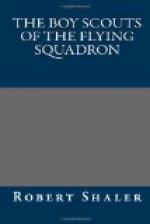“Huh! good riddance of bad rubbish,” grunted Bud. “I’d give something to see how they make out with the figuring I did on that paper they hooked from our shanty. They couldn’t make head or tail of it in a year; so they are not likely to steal the idea of my wonderful stability device, which is luck enough for me for one day.”
Hugh gave Ralph a suggestive look, as though begging him not to say anything just then to hurt poor Bud’s dream of fame. Later on, when they were back home again, they could break the sad news to him gently, as the officer had suggested. What was the use of spoiling his pleasure for that glorious day? They might never have another chance to be with the brave fellows of Uncle Sam’s Flying Squadron; so it was just as well to make the most of their opportunity while it lasted.
The Lieutenant tried to coax them to stay longer, but Hugh knew they must be on their way home shortly after noon, much as he wanted to remain. Their folks might be anxious if they did not show up some time that evening; and the next day would be Sunday, which was pretty strictly observed in their home town.
The balance of their stay in the experimental camp was passed in trying to learn all they possibly could about things connected with aviation.
“Those who observe the trend of events closely,” Lieutenant Green told them, as he only too gladly showed them many clever devices calculated to increase the efficiency of aeroplanes when in action, “are firmly convinced that should we ever get embroiled in a war with any first-class power, which we all hope will never happen, aeroplanes are bound to occupy a very important place in the field.”
“But I’m sure I read lately that there has been talk of limiting the activities of air craft in war times?” Hugh questioned.
“Yes, and already it has been settled that bombs shall not be dropped into besieged cities where civilians may be killed, but only into forts and on war vessels,” the army officer told them. “But, after all, that is only a small fraction of the uses to which a war aeroplane may be put. For scouting and learning the movements of troops, it is a wonder. No matter how skilful a general may be, his plans are all apt to go amiss if the quick movements of his forces are discovered by the airman from a mile above. The aviator may be well out of reach of any missiles modern guns can throw upward, but with his glasses he can watch every movement and signal the news to headquarters.”
The scouts were astonished to hear all this.
“Where would the genius of a Napoleon have been,” remarked Lieutenant Fosdick in turn, “if aeroplanes had been in common use as far back as Waterloo? You may remember that the secret of his great success in battle was the mobility of his troops. He would divide his army and hurl a part of it so as to strike the enemy unexpectedly on the flank, timing his own frontal attack so as to complete the confusion. Well, if the enemy had known what was coming they could easily have whipped the divided force of the great French leader in detail. The coming of man’s mastery over the air will cause new and strange happenings in case of war. By degrees, fighting will become so terrible that all nations must unite in a bond to keep the peace forever.”




